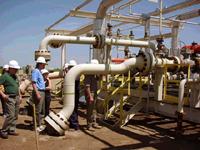When it comes to the oil sands, it seems many Albertans believe what they’re led to. You can hardly blame ’em, though: The petro firms presently ripping into the boreal forest aren’t exactly offering public tours with coffee and balloons for the kids.
Maybe that helps explain why a recent poll found that 66 percent of Albertans reckon that at least some–if not all–of the more than 40-odd million tonnes of carbon dioxide emissions generated by oil-sands facilities each year are being captured and stored safely underground.
In fact, the real number is zero. Oops.
Why are so many so misinformed?
Partly its because there is so much chatter out there these days about carbon capture and storage, or CCS–the “techno-fix” that politicians and petroleum execs trot out whenever anyone hazards to suggest that cooking vast chunks of Canadian soil under a blue flame is maybe not such a great idea.
The idea behind CCS is simple:
A network of scrubbers and pipes could one day transport carbon dioxide from coal- and oil-sands plants, and inject it into geological formations deep in the earth’s crust where it will theoretically remain locked away forever. It’s a great plan, actually, and will likely prove a crucial interim step as we transition to the post-carbon age. But only if it actually gets built. And right now – with the exception of a single test project in Saskatchewan – its a classic example of what software developers call “vaporware.”
Alberta has been talking about CCS since at least 2002.
That year, the province’s environment ministry released a report ironically titled “Albertans and Climate Change: Taking Action .” The report assured us that, thanks to CCS, “zero-emission coal plants” would be undergoing commercial testing right about now. None are even on the drawing boards.
The Federal and Albertan governments – along with the Canadian Association of Petroleum Producers and an industry group called the Integrated CO2 Network (they operate as ICO2N )–are together advancing the message that capture-and-storage is an any-day-now proposition.
Last year, the province and the feds together announced a joint task force on the subject, which ultimately recommended that government (that’s you and me, Fred) spend $2 billion to get three CCS projects up and running by 2015.
Meanwhile, premier Ed Stelmach’s most recent climate-change plan doesn’t actually mandate CCS. Instead, his government assures that a:
government-industry council will provide a made-in-Alberta blueprint for the immediate advancement of carbon capture and storage technology.”
All of this “advancement” and “enabling” sounds great, except for one snag. By failing to enact any serious reduction targets, government isn’t giving industry the push it needs to actually start building anything.
For its part, Canada’s oil extraction sector – which, thanks largely to the oil sands, is expected to post a $23 billion profit this year–is waiting for its first government handout before getting down to work. So ’round and ’round we go, while the planetary thermostat inches up another fraction of a degree.
Meantime, the “stall ’em with promises” strategy appears to be working. All the impressive-sounding acronyms have hoodwinked a good number of otherwise sensible Albertans into thinking that CCS is actually happening.
Attention all Albertans: It ain’t.
Subscribe to our newsletter
Stay up to date with DeSmog news and alerts






